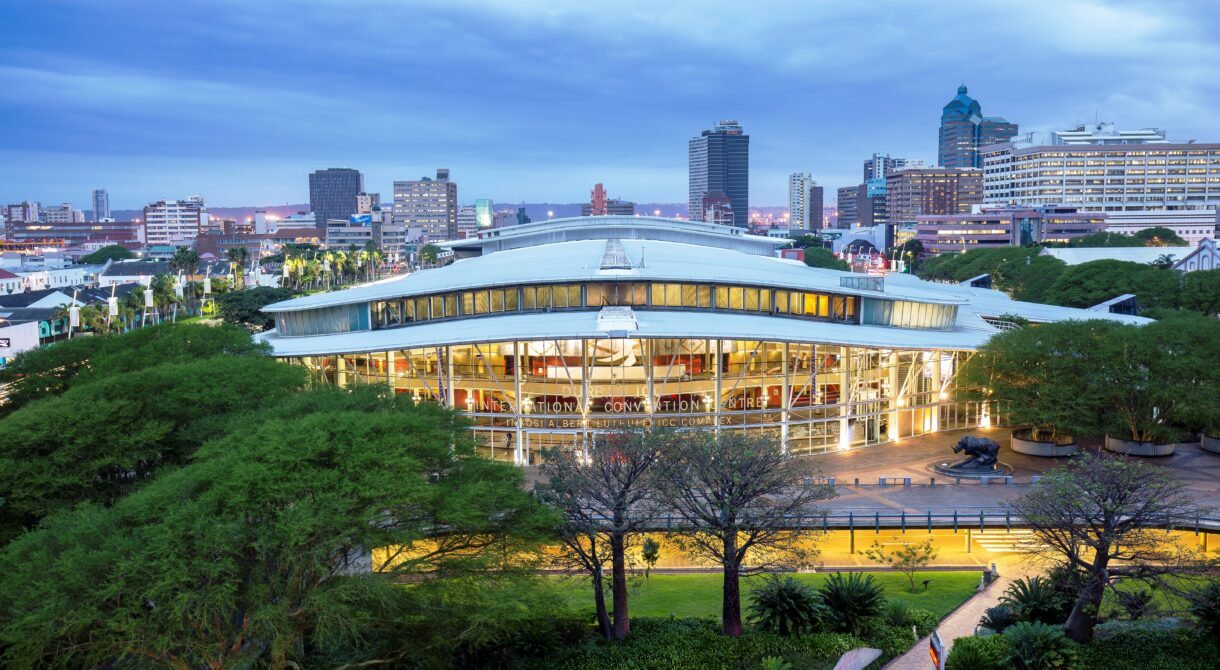When former president Nelson Mandela opened the Durban ICC in 1997, it was South Africa’s first international convention centre. It has since been voted “Africa’s Leading Meetings and Conference Centre” by the World Travel Awards no fewer than 17 times. But the real game changer came in 2011, when the centre achieved the ISO 14001 certification for its environmental responsibility—proof of its pledge to improve its environmental performance.
The Durban ICC hasn’t pulled the brakes on how green it can go since. The centre continues striving for international ISO Certifications, obtaining and maintaining the ISO9001 certification for quality management in its operational systems; OHSAS18001 for health and safety; and the ISO22000 certification, which ensures the highest standards of food safety. “Today, award-winning meeting venues such as the Durban ICC have a moral and ethical imperative to pave the way in environmental initiatives,” explains Scott Langley, Durban ICC’s marketing, sales and events director.“We need to be an example to other global players of the ways in which our business can be done in more responsible ways.”
Setting standards
To create a sustainable environment inside and out, Durban ICC took advantage of indigenous landscaping. Most of the plants are local, so unlike exotic plants, there is less need for irrigation. In fact, the 112,000-sqm centre’s water usage is low considering its size. Sensor taps have been installed in the bathrooms to prevent water waste, toilets have been converted to a more efficient water usage system, and the centre is exploring grey water harvesting.
Waste is separated and sorted on site before being sent out for recycling, and this even includes cooking oil from the culinary department. Simple switches like tap water-filled jugs (Durban has excellent water quality) in place of plastic bottles, bio-degradable cutlery and food containers, and a shift from using tablecloths at conferences have helped reduce the complex’s annual waste by nearly 40 percent. The centre uses an innovative ice-harvesting system to cool the venue which uses a fraction of the energy of traditional air-conditioning. In addition, basement parking lights have been switched out for energy-efficient LED light fittings—reducing energy by 75 percent—and 25 percent of the new light fixtures were fitted with motion sensors. Thanks to an energy efficiency retrofit that incorporated the latest in lighting technology, the complex was able to reduce its energy requirements by an impressive 7 percent.
The centre even went a step further and partnered with eThekwini Municipality, Philips Lighting Southern Africa, and Eskom, to retrofit 155 street lights in the Durban ICC precinct with energy-efficient Iridium LED street lights, in addition to installing solar traffic lighting at four of the major road intersections. “Intelligent architecture, sustainable meeting design, and green initiatives in our operations are the way forward,” Langley says. “Thankfully, the majority of clients in our industry are of the same mind and are actively choosing venues which have made these practices part of their daily operations.”
Chatting Climate Change
Green initiatives are part of the daily operating procedures at Durban ICC, but one recent event that brought sustainability to the forefront of the conversation was the UN’s Intergovernmental Panel on Climate Change (IPCC), held in January 2019. At the weeklong meeting, experts gathered to discuss “climate change adaptation in the developing world.” This is a topic that hits close to home, since the South African interior temperatures are rising at “twice the global rate of temperature increase,” according to South Africa’s deputy director-general on climate change, sustainable development and air quality, Dr. Tsakani Ngomane.
This article was written by Boardroom editor Lane Nieset. The right to use it, in parts or in full, has to be granted by the Publisher.
In an African News Agency article, the deputy director-general is quoted saying: “Rapid urbanization is expected in Africa over the next few decades and into the 21st century, and how this growth can be sustained under climate change is a critical question.” The working group of delegates at the IPCC meeting gives the Durban ICC a chance to play a personal role in realm of climate change. The working group of experts who gathered for the meeting will help contribute to a report on the impacts of “climate change on natural and human systems and their vulnerabilities,” which will be incorporated into the 2023 United Nations Framework Convention on Climate Change (UNFCCC).
“The Durban ICC is committed to protecting and preserving the environment in all of its activities,” says CEO Lindiwe Rakharebe. “This entails continuous improvement, not only in the quality of the events we host, but also in our daily operations; we are doing everything we can to reduce our energy consumption, minimise our waste and actively promote our recycling programme. It is important that every member of our team embraces these values, not only for themselves, but also for the benefit of future generations to come.”
